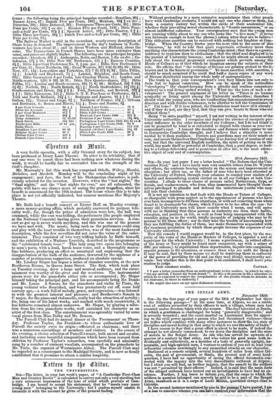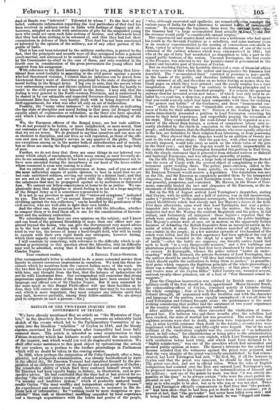THE INDIAN ARMY. November 1850.
Srn—In the first page of your paper of the 28th of September last there' is the following passage—, At the same time, at Alipore, we Bee a rabble rout of soldiers permitted by their officers to sack u village, whose men had resented undue freedom taken with the women. The duel tolerated at Banda, in which a gentleman is challenged for being generally disagreeable,' and is severely wounded ; and the court-martial on Lieutenant Rose for appeal- ing to the civil lower against a person who had threatened violence—these are trifles which combine with many other instances to slairethe lax state of discipline and moral feeling in that army to which we owe the itafetyOf India:" I have reason to fear that a great effort is about to be -Made, if indeed the attempt be not already commenced, to ery down the discipline and the state of morals -in the Bengal Army. As one who has served-for upwards of a quarter of a century in that army, and who values his good name both in- dividually and collectively, as a member of a body of .generally upright,lia- nourable, and high-spirited men, I venture to entreat of you not to lend year influential columns unwittingly-to any unmerited attacks on our charactee., Stationed at a remote outpost, several hundreds of miles from either Cal- cutta, the seat of government, or Simla, the present seat of army head- quarters, I have had no opportunity of seeing the official documents con- nected with the inquiry into the very discreditable outbreak at Alipore ; but I think you will find, on further inquiry, that the assault by the soldiers was not "permitted by their officers." Indeed, it is said that the main fangs of the alleged outbreak have turned out on investigation to'have bad no ex- istence. Further, -I beg leave to inform you. that the corps to witiehthe soldiers in question belonged can scarcely be said to be a part of the Bengal Army, inasmuch as it is n corps of Local Militia, quartered always, close; to Co'"' In the second instance mentioned by you in theect quoted, Ian at,a ION con to ceiee ivheceinryelk-cONPAVe ,Y4T WRT,13■OB 010 tie slue' at Banda was "tolerated." Tolenned by whom ? To the best of my belief, authentic information regarding the real particulars of that duel has been received in military circles in India with feelings of disgust and ab- horrence, mingled no doubt with sentiments of pity for the misguided young men who could act upon such false notions of honour, and afterwards boast that they had done nothing to be ashamed of, and that they had lost their commissions in defence of their honour. That duel has not been sanctioned or tolerated by the opinion of the military, nor of any other portion of the public of India. That ithas not been tolerated by the military authorities, is proved by the fact, that the principals and seconds were all four arraigned before a general court-martial, and sentenced to be cashiered ; which sentence was confirmed by the Commander-in-chief in the case of three, and only remitted in the fourth case in consideration of the gross provocation the young officer had received from his antagonist. With reference to the third instance specified by you, granting that Lieu- tenant Rose acted foolishly in appealing to the civil power against a person who had threatened violence, I submit that no inference can be drawn from Lieutenant Rose's want of discretion prejudicial to the state of discipline or moral feeling in the Bengal Army. I beg you to note, that the person whose very unbecoming conduct and threats induced Lieutenant Rose too hastily to resort to the civil power is not himself in the Army. I may add, that the feeling is very general in the North-western Provinces, and is understood to be shared in by our estimable and respected Governor-General himself, that Lieutenant Rose has been very hardly dealt with in being. deprived of his staff-appointment, for what was after all only an act of indiscretion.
Possibly, the "many other instances" to which you allude as indicating the lax state of discipline and moral feeling in that army (of Bengal) would equally admit of explanation or refutation, as the three you have specified, and which I have above attempted to show do not indicate anything of the sort.
We, the European officers of the Bengal Army, are but rude soldiers. We do not pretend to be better, or more enlightened, or snore moral, than our comrades of the Royal Army of.Great Britain ; but we do pretend to say that we are no worse. We do pretend to say that ourselves and our men are as obedient to discipline and our lives as well regulated, as those of the offi- cers and, men of her Miijesty's service in any quarter of the globe. There are exceptions among us in the matter both of subordination and of morals; but so there are among the Royal regiments ; so there are in any large body of men.
Further, we do not deny that there are some things in our internal eco- noray which admit of amendment, which many among us most fervently de- sire to see amended, and which it has been a grievous disappointment not to have seen amended during the incumbency at our head of the brave soldier whose command is even now coming to a close.
But we entreat of our fellow-countrymen at home, and of you as one of the meet influential organs of public opinion' to bear in mind that we are but rude unlettered soldiers, serving our country in a distant land; and that we are not on the spot, nor are we gifted with the abilities to reply to all -the calumnies that may be propagated against us by malicious or interested font We entreat our fellow-conntrymen at home to dons justice. We em- phatically deny that discipline or moral feeling is so lax in a large majority of the Bengal Army as it is sometimes represented to be.
It is net in my province to speak of the "untoward symptoms" indicated by yeu. The first ones, of "an annual finance deficiency," and "a village revolting against the tax-collectors," can be handled by the gentlemen of the civil service, who are well able to fight their own battles. And the other one, the question how to deal with the Afrcedies, whether to conquer them or to fend them off, is one for the consideration of Govern- ment and the military authorities.
We subordinates may have our own opinions on the subject; and I know and can boast of the personal friendship of more than one officer now em- ployed beyond the Indus, who can give the Government very sound advice as. to the best mode of dealing with a confessedly difficult question ; men -tried in war too, the heroes of many a hard-fought field, who will be ready le execute with their own right hands any enterprise, however daring, which their sagacity and experience may suggest. I will conclude by remarking, with reference to the difficulty which is ad- mitted as pertaining to this question about the Afreedies, that its difficulty may well be admitted, seeing that it has foiled the brave and energetic Sir Charles Napier.
(Our correspondent's letter is calculated to do a more extended service than merely to correct erroneous impressions in ourselves. We took the three in- cidents which he mentions from the current Indian news of the week. On the two first his explanation is very satisfactory,. On the last, we quite agree with him and thought from the first, that the balance of indiscretion did notlie with Lieutenant Rose. Our correspondent will remember that strong impressions against the state of the Army in India have been created by the language and official acts of Sir Charles Napier. But if men animated by the same spirit as this Bengal Field-officer will use their faculties as he does, they will correct any opinion in this country that may be too onesided ; and, which is more important, they must conquer any inferior spirit that may lurk, however partially, among their fellow-soldiers. We are always glad to cooperate in such a process.—En.]



























 Previous page
Previous page